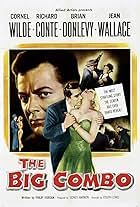Ajouter une intrigue dans votre langueA West German trucker who illegally sells black gravel reunites with a former lover, now married to an American.A West German trucker who illegally sells black gravel reunites with a former lover, now married to an American.A West German trucker who illegally sells black gravel reunites with a former lover, now married to an American.
Histoire
Le saviez-vous
- AnecdotesFirst German film shown on TCM's "Noir Alley" on 14 December 2024.
- GaffesAnni and Bill invite Bob into the back of their car to get out of the rain. BUT once in the car Bob's hair and jacket collar are dry, even though the rainfall on the rear window is quite obviously quite significant.
- Versions alternativesShortly after its general release, the film was changed from its premiere cut. Due to complaints by the Central Council of Jews in Germany, two scenes were shortened in which a character is revealed to be a Holocaust survivor and an antisemitic slur is used against him. The ending was also changed and is much less dark: in the shortened cut, both Inge and Robert survive. The premiere cut was restored during the film's digital restoration in 2016.
Commentaire à la une
While I disagree with Eddie Muller's opinion, voiced on TCM's Noir Alley, that this 1961 German film is a masterpiece...the American characters, played by Germans, are too stiff/caricatured, for one thing, and the key scene where Bill/Anni are killed is badly edited, for another...I do think it's a very good late era noir. It does what all fine entries in this darkest of genres must do, namely create a believable moral hellscape. In this case it is West Germany in the uneasy period when WW2 was still very much alive in the hearts/minds of the defeated Germans and relations with the victors is fraught, to say the least. The key visual symbols of this tense, fearful and more than occasionally violent mood are the gravel pit/burial ground and the divey bar/brothel where ceremonies of moral corruption, from stealing to anti Semitism to murder, are enacted. And through these images the tawdry, bleak, lost atmosphere is powerfully conveyed by director Helmut Kautner. Indeed, too powerfully for the German censors of the time who preferred a more "uplifting" vision of their country in the Kennedy 60s (think Elvis in "GI Blues") and thus falsely accused the film of hostility toward Jews (it is, actually, quite the opposite) and ostracized Kautner from film making . Hard to feel too sorry for the guy who, after all, worked steadily in Germany under the Nazis, but certainly not difficult to feel exasperation at the willful misunderstanding from the cultural establishment. B plus.
Meilleurs choix
Connectez-vous pour évaluer et suivre la liste de favoris afin de recevoir des recommandations personnalisées
Détails
- Durée1 heure 53 minutes
- Couleur
- Mixage
- Rapport de forme
- 1.66 : 1
Contribuer à cette page
Suggérer une modification ou ajouter du contenu manquant

Lacune principale
By what name was Sous le gravier noir (1961) officially released in India in English?
Répondre


























